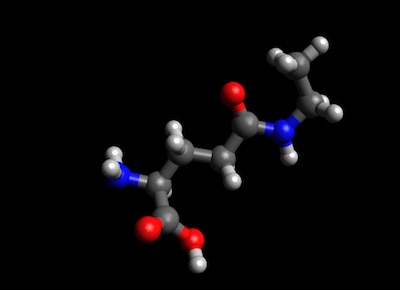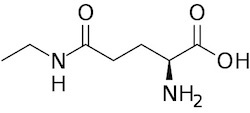L-Theanine Molecule

L-Theanine Ball and Stick Model
To View the L-Theanine Molecule in 3D --->>in 3D with Jsmol
Theanine C7H14N2O3

Theanine also known as L-γ-glutamylethylamide and N5-ethyl-L-glutamine, is an amino acid analogue of the proteinogenic amino acids L-glutamate and L-glutamine and is found primarily in particular plant and fungal species. Theanine gives a savory (umami) flavor to green tea infusions. The name "theanine" without a prefix generally implies the enantiomer L-theanine, which is the form found in green tea leaves and as a dietary supplement ingredient. Most studies have used L-theanine. The opposite enantiomer, D-theanine, has been studied less. L-theanine is more readily absorbed than d-theanine. It has been shown that if equal amount of ‘L’ and ‘D’ form is given separately to mammals, ‘L’ form has almost three times more absorption capacity than ‘D’ form in the plasma level (see Health Benefits of Theanine in Green Tea: A Review )
Pharmacology
Theanine is structurally similar to the excitatory neurotransmitter glutamate, and will bind to glutamate receptors, though with much lower affinity.
Glutamate is the brain’s most important excitatory neurotransmitte. L-theanine will bind to the glutamate receptors and block the glutamate’s effects. This produces an inhibitory effect which produces a calming, relaxing effect by decreasing anxiety.
Theanine also increases serotonin, dopamine and glycine levels in various areas of the brain, as well as BDNF and NGF levels in certain brain areas. However, its effect on serotonin is still a matter of debate in the scientific community, with studies showing increases and decreases in brain serotonin levels using similar experimental protocols.
Unlike prescription anti-anxiety drugs, however, some of which mimic GABA’s effects, L-theanine produces its anti-anxiety effects without producing sleepiness or impairing motor behavior. 4 In fact, L-theanine has been shown in human studies to moderately improve alertness and attention while exerting its anxiety-reducing effects. see source
Physiological Functions of L- Theanine
-Anti-Anxiety and Depression
--Anti-Fatigue
--Hypotensive Response
--Improvement in Memory
--Anti-Tumor
--Neuroprotection
Readings and References
- Health Benefits of Theanine in Green Tea: A Review
- Effects of L-Theanine Administration on Stress-Related Symptoms and Cognitive Functions in Healthy Adults: A Randomized Controlled Trial
- L-Theanine: A Unique Functional Amino Acid in Tea (Camellia sinensis L.) With Multiple Health Benefits and Food Applications
- Inhibitory effects of l-theanine on airway inflammation in ovalbumin-induced allergic asthma
- L-Theanine Reduced the Development of Knee Osteoarthritis in Rats via Its Anti-Inflammation and Anti-Matrix Degradation Actions: In Vivo and In Vitro Study
- Brain Benefits of L-Theanine
- l-Theanine as a Functional Food Additive: Its Role in Disease Prevention and Health Promotion